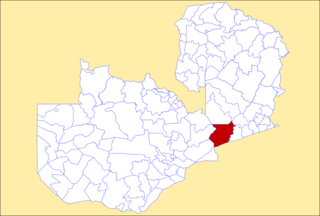 |
|---|
Nyimba is a constituency of the National Assembly of Zambia. [1] It covers Chitizauwe, Chiwowa, Kacholola, Mayawa and Nyimba in Nyimba District of Eastern Province.
 |
|---|
Nyimba is a constituency of the National Assembly of Zambia. [1] It covers Chitizauwe, Chiwowa, Kacholola, Mayawa and Nyimba in Nyimba District of Eastern Province.
The city of Chipata is the administrative centre of the Eastern Province of Zambia and Chipata District. It was declared the 5th city of the country, after Lusaka, Ndola, Kitwe and Livingstone, by President Edgar Lungu on 24 February 2017. The city has undergone rapid economic and infrastructure growth in the years, leading up to city status.

Elections in Zambia take place within the framework of a multi-party democracy and a presidential system. The President and National Assembly are simultaneously elected for five-year terms.
The Nsenga, not to be confused with the Senga, are a Bantu ethnic tribe of Zambia and Mozambique. In Zambia, they are found in two districts of Eastern province namely Nyimba and Petauke. They are also dialects with the Nsenga Luzi of the Luangwa valley in Chief Nyalugwe, Mboloma and Lwembe and the Chikunda of Luangwa Boma (Feira). Their Senior Chief is Kalindawalo M'ndikula, who resides in Merwe 10 kilometers from Petauke Boma. The following are Nsenga Chiefs: Chiefs Mwape, Nyamphande, Nyanje, Mumbi, Sandwe, Nyalugwe, Ndake, Senior Chief Lwembe, Senior Chief Mboloma and Mwanjaw'anthu. They are well known for their culture and artwork which includes bead work and basketry. They also grow groundnuts, maize, millet and sorghum for consumption and cotton (Thonje) as cash crop, and are popular for their Mbewa (Mice), a practice which they are often teased for. The Nsenga language spoken by people of this tribe has been adopted by many groups in Zambia and diluted to Zambia’s widely spoken language Chinyanja or Nyanja.

The Great East Road is a major road in Zambia and the main route linking its Eastern Province with the rest of the country. It is also the major link between Zambia and Malawi and between Zambia and northern Mozambique. However, the route does not carry as much traffic as many of the other regional arterial roads and between the main cities it serves, Lusaka and Chipata, it passes through rural and wilderness areas. In Lusaka the road forms the main arterial road for the eastern suburbs. The entire route from Lusaka to Chipata and the Malawi Border Post is designated the T4 Road on Zambia's road network.

The National Assembly is Zambia's unicameral legislative body. Between 1972 and 1990, Zambia was a one-party state with the United National Independence Party (UNIP) as the sole legal party.

The ten provinces of Zambia are divided into a total of 116 districts as of 2018.

The Speaker of the National Assembly of Zambia is a position established under Article 69(1) of the constitution. The Speaker is elected by members of the Assembly from anyone eligible to be elected to the National Assembly, but cannot be a sitting member.

The Nyimba District is a district of Zambia, located in the Eastern Province. The capital lies at Nyimba. As of the 2010 Zambian Census, the district currently has a population of 99,159 people.

General elections were held in Zambia on 19 December 1968 to elect the National Assembly and President. The first post-independence polls saw incumbent Kenneth Kaunda retain his post as president, whilst his United National Independence Party, the only party to field candidates in all 105 constituencies, won 81 of the 105 seats in the National Assembly. Voter turnout was 82.5% in the parliamentary election, but 87.1% in the presidential election.

General elections were held in Zambia on 5 December 1973. They were the first elections held since the country was formally declared a one-party state in August, with the United National Independence Party (UNIP) as the only legally permitted party. UNIP leader Kenneth Kaunda was automatically elected to a third five-year term as President, and was confirmed in office via a referendum in which 88.8% of voters approved his candidacy. UNIP also won all 125 seats in the National Assembly. Voter turnout was 39% of the 1,746,107 registered voters for the presidential election, and 33% for the National Assembly election.

Nalolo is a constituency of the National Assembly of Zambia. It covers Nalolo District in Western Province.

Mulobezi is a constituency of the National Assembly of Zambia. It covers Mulobezi and surrounding areas in Mulobezi District of Western Province.

Mongu Central is a constituency of the National Assembly of Zambia. It covers part of Mongu District in Western Province.

Nalikwanda is a constituency of the National Assembly of Zambia. It covers part of Mongu District in Western Province.

Magoye is a constituency of the National Assembly of Zambia. It covers the village of Magoye and surrounding areas in Mazabuka District of Southern Province.

Mangango is a constituency of the National Assembly of Zambia. It covers part of Kaoma District in Western Province.

Luena is a constituency of the National Assembly of Zambia. It covers Limulunga District in Western Province, including the town of Limulunga.

Menyani Zulu is a Zambian politician who serves as Member of Parliament for Nyimba in the National Assembly of Zambia. He was elected member of parliament in August 2021.
Olipa Phiri is a Zambian politician. She was the Minister for Community Development and Social Welfare in September 2018. She was subsequently appointed a Minister in the Office of the Vice President of Zambia in 2019. She is a member of the Patriotic Front representing Nyimba (constituency). She has also served as Member of Parliament in the National Assembly of Zambia from 2016 to 2021.